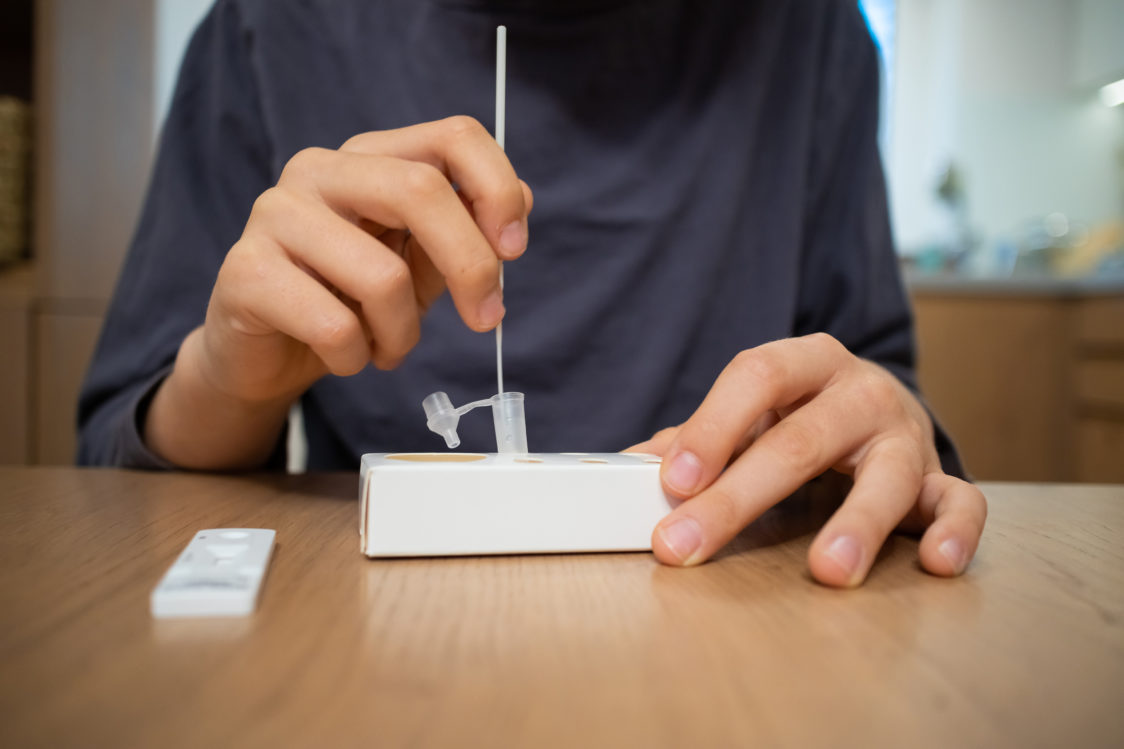Table of Contents
Caffeine is one of the most widely used and popular legal stimulants in the world. In its various forms, it can be taken by the mentally strained student or busy businessman, as well as an endurance or strength athlete. But you may have wondered what’s behind the reason that everyone can react differently to caffeine. Yes, you guessed right, your genes are to blame. We’re going to take a good look at caffeine metabolism based on your genetic makeup today.
Why should you be interested in how you metabolise caffeine?
Caffeine is a well-known alkaloid of natural origin that has been shown to increase physical and mental performance. It is naturally found in coffee, tea, cocoa and Yerba Maté. It is also added to dietary supplements such as caffeine tablets, capsules or drinks, fat burners or pre-workout supplements.
Knowing your genetic makeup, which determines, among other things, the rate at which caffeine is removed from your body, can give you useful information for proper dosing. It can also help you to determine whether you can actually benefit from its use or whether it can harm you. [4]
Where and how is caffeine broken down in the body?
The liver is the central organ of metabolism and is involved in the breakdown of caffeine and other substances that are foreign to the body, generally known as xenobiotics. The liver cells contain a special group of enzymes called cytochrome P450 (CYP450) that modify these substances into a form that can be more easily and quickly eliminated from the body. This is most often done through the urine or bile. In the case of caffeine, it is mainly one of the enzymes of this cytochrome family called CYP1A2. This breaks down caffeine into its three metabolites, paraxanthine, theophylline and theobromine, which are eventually excreted out of the body in the urine. [8]

What effect does genetics have on the rate of caffeine breakdown?
This CYP1A2 enzyme is encoded in your genetic information by two so-called alleles, which can be thought of as two variants of the gene. These two variants of the gene – one inherited from your mother, the other from your father – are denoted by the letters A and C.
- Studies have shown that people who have the AA allele variant in their genes excrete caffeine from the body faster and are therefore considered fast metabolisers.
- In contrast, people who have variants of the AC or CC alleles excrete caffeine from the body more slowly and are referred to as slow metabolisers.
The rate of excretion of foreign substances (including caffeine) from the body is related to the so-called biological half-life. This is the time (usually expressed in hours) for the body to reduce the concentration of a substance in the blood by 50%. The average biological half-life of caffeine is given as 4-6 hours, but due to these genetic differences, the range can be as long as 1.5-10 hours. [8]
This is directly related to how you react to caffeine – some people have no problem having a pre-workout pick-me-up in the early evening and then going to bed after returning from the gym, because it wears off quickly. While for some, an afternoon coffee can present a significant problem with falling asleep at night. In this case, the caffeine takes much longer to be eliminated from the body and still has an effect.
If you want to learn more about coffee, you shouldn’t miss our article Is Coffee Healthy? 7 Reasons Why You Should Give It a Chance.
What does the genetics of caffeine breakdown involve?
Sports performance
The largest study to date on this topic was conducted in 2018, involving 108 athletes who were tasked with cycling as fast as possible over a 10 km course. They completed this course sequentially with either a placebo (0 mg/kg), a 2 mg/kg dose, or a 4 mg/kg body weight dose of caffeine. The researchers were interested to see how the interaction between genetics and the administered dose of caffeine affected the final time. [5]
- Fast metabolisers (AA) improved their exercise time at 2 mg/kg compared to the placebo by 4.8%, and at 4 mg/kg by 6.8%!
- In slow metabolisers (AC), the resulting exercise time was the same with all 3 doses.
- However, in the second group of slow metabolisers (CC) with the least favourable genetics, administration of a dose of 4 mg/kg caffeine worsened their time by 13.7% compared to the placebo.
The study clearly showed that caffeine has a positive effect on aerobic performance only in fast metabolisers (AA), while it has a negative effect in slow metabolisers (CC). Therefore, you need to know your genetics so that it plays in your favour and not against you.
If you want to learn more about the concept of pre-workout caffeine use, read our article Caffeine Before a Workout: Functions, Benefits, Risks and Dosage.
Anxiety and nervousness in athletes
Caffeine affects not only physical but also mental functions such as concentration, reaction time and alertness. However, at higher doses, nervousness, anxiety and heart palpitations can occur. The traits responsible for these unpleasant feelings, which can potentially impair athletic performance, are encoded by a gene called ADORA2A.
To make it easier to understand, you can think of it as a “sensitivity” to caffeine. Several studies have shown that individuals with a combination of TT alleles are much more sensitive to caffeine in this respect than carriers of the CT and CC alleles. Thus, in these athletes, a higher dose of caffeine may cause exaggerated pre-race anxiety, which may reduce their performance. Combine this with a predisposition for slow caffeine metabolism and such athlete could be in for quite a challenge! [1, 7]

Blood pressure and cardiovascular health
One study, for example, showed that slow caffeine metaboliser (CC) status was associated with a 72% higher risk of developing high blood pressure when drinking 2-3 cups of coffee per day. And 200% higher risk of developing high blood pressure when drinking more than three cups of coffee per day, compared to slow metabolisers who did not drink any coffee. Another study had a similarly unfavourable outcome. Coffee intake of two or more cups per day was associated with a higher risk of myocardial infarction in slow metabolisers. [2] [6]
You might be interested in these products:
How to adjust your caffeine intake according to your genes?
Not only objectively from scientific studies, but also subjectively from your own perceptions after consuming caffeine in various forms, it is clear that not everyone reacts the same way to caffeine. You should adjust your caffeine intake accordingly.
Caffeine intake prior to physical activity
Fast metabolisers who do not feel any jitters or anxiety after caffeine do not need to worry about its intake before activity. The ideal dose used in studies to promote performance is considered to be 3-6 mg/kg BW. Those who have some experience with caffeine will tell you that this is a very high dose! However, it is currently believed that the minimum effective dose of caffeine for performance enhancement is at 2-3 mg/kg BW.
Therefore, I would recommend starting at this dose before exercise and gradually increasing if necessary. What about slow metabolisers? You can get by without caffeine. Alternatively, you can try very small doses of around 1 to 2 mg/kg at the most, if it may provide at least a small benefit for you, outweighing any possible negatives. [4, 5]
Caffeine intake in the afternoon and early evening
Fast metabolisers break down caffeine in the body quickly. Therefore, it can be assumed that consumption in the late afternoon should not be a problem. However, it’s best to test in practice what dose of caffeine you can have and at what time at the latest so that it doesn’t have a negative effect on falling asleep and the quality of your sleep.
Slow metabolisers should be more careful with caffeine later in the day if they don’t want to risk difficulty falling asleep and poor sleep quality. Again, however, it is necessary to test any reasonable caffeine intake directly on yourself and choose your dosage accordingly. In practice, this may mean taking only half a pre-workout dose or opting for a completely decaffeinated version.
Total caffeine intake per day
If caffeine leaves you feeling wonderfully energised and invigorated, ready to break records in sport and perform well at university or work, you don’t need to worry too much about your intake. However, don’t overdo it, especially in the evening. It is also advisable not to exceed the total daily recommended intake set by the EFSA. This is 400 mg of caffeine for a 70 kg person (i.e. 5.7 mg/kg body weight). [3]
For those of you who metabolise caffeine more slowly and are generally more sensitive to it, I recommend more caution here. While the EFSA higher threshold limit should be safe for everyone, the genetic lottery may cast some doubt on this limit. Perhaps due to several studies that have shown some association between slower caffeine metabolism and higher risk of cardiovascular disease.
For such a person, it is therefore obviously advisable to consume only the amount of caffeine where the benefits of caffeine intake (e.g. the simultaneous intake of antioxidants in high-quality coffee) still outweigh the potential risks. Such an amount, for example, would only correspond to a maximum of 1-2 cups of coffee per day.
If you’re interested in learning more about caffeine, check out our article Caffeine and How to Make Your Training More Effective.

Where and how can you get your sensitivity to caffeine tested?
Nowadays, it is possible to undergo genetic testing using simple DNA home tests in the form of sampling kits from specialised genetic laboratories that offer evaluation of entire panels of different genetic parameters.
This genetic testing is increasingly attractive for athletes. The test includes an analysis of caffeine metabolism (CYP1A2, ADORA2A), but also the genetic basis for the development of cramps, predisposition for muscle growth, recovery, antioxidant capacity of the body, development of strength and endurance and other interesting parameters.
However, such testing can also apply to your metabolism and nutrition. Specifically, how are you able to use certain vitamins, minerals or essential omega-3 fatty acids, which may predispose you to an excess or deficiency. Based on this, you can adjust your diet accordingly.
Screening for hidden traits for rare inherited diseases such as phenylketonuria, cystic fibrosis, muscular diseases, etc., which can potentially be passed on to your offspring, also seems to be of great interest. This is possible even if you and your partner do not suffer from these diseases. The examination can also give you information about the risk of developing so-called civilization diseases (type 2 diabetes, cardiovascular diseases, certain types of cancer).
Interested in this topic and want to learn more about home DNA testing? Find out everything you need to know about home DNA testing in our article Everything You Need to Know About Home DNA Testing. If you want to try genetic testing, you shouldn’t miss trying test kits from TellMeGen and GenePlanet.

What should you remember?
Every person is different and we all differ in our sensitivity to caffeine and how you metabolise it. Current science therefore distinguishes between fast and slow metabolisers of caffeine. These characteristics can be estimated to some extent based on your reactions to its intake (nervousness, heart palpitations, performance enhancement, poor falling asleep after its intake). Accordingly, it is advisable to adjust your caffeine intake so that you reap more benefits than drawbacks from its use. If you want to be clear on this, it is suggested to undergo a simple genetic test through a home DNA test to fully reveal these traits.
[1] ALSENE K. – Association between A2a receptor gene polymorphisms and caffeine-induced anxiety. – https://pubmed.ncbi.nlm.nih.gov/12825092/
[2] CORNELIS M. – Coffee, CYP1A2 genotype, and risk of myocardial infarction. – https://pubmed.ncbi.nlm.nih.gov/16522833/
[3] EFSA – Scientific Opinion on the safety of caffeine – https://efsa.onlinelibrary.wiley.com/doi/epdf/10.2903/j.efsa.2015.4102
[4] GUEST N. – International society of sports nutrition position stand: caffeine and exercise performance. – https://www.ncbi.nlm.nih.gov/pmc/articles/PMC7777221/
[5] GUEST N. – Caffeine, CYP1A2 Genotype, and Endurance Performance in Athletes. – https://pubmed.ncbi.nlm.nih.gov/29509641/
[6] PALATINI P. – CYP1A2 genotype modifies the association between coffee intake and the risk of hypertension. – https://pubmed.ncbi.nlm.nih.gov/19451835/
[7] ROGERS – Association of the anxiogenic and alerting effects of caffeine with ADORA2A and ADORA1 polymorphisms and habitual level of caffeine consumption. – https://www.ncbi.nlm.nih.gov/pmc/articles/PMC3055635/
[8] THORN C. – PharmGKB summary: caffeine pathway. – https://www.ncbi.nlm.nih.gov/pmc/articles/PMC3381939/


Add a comment